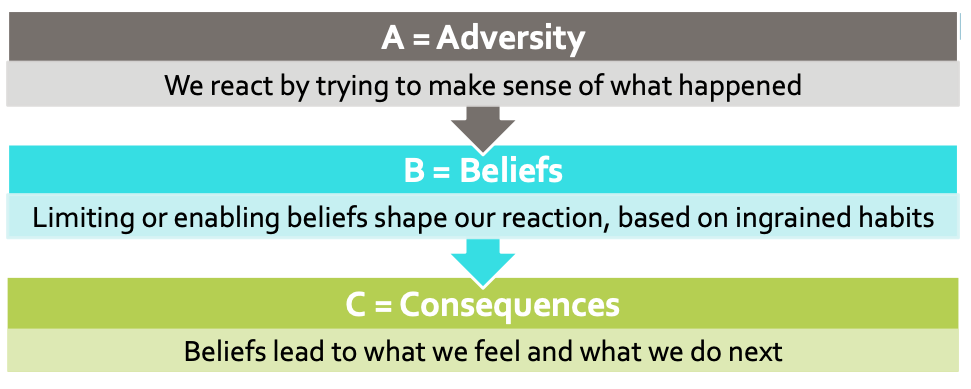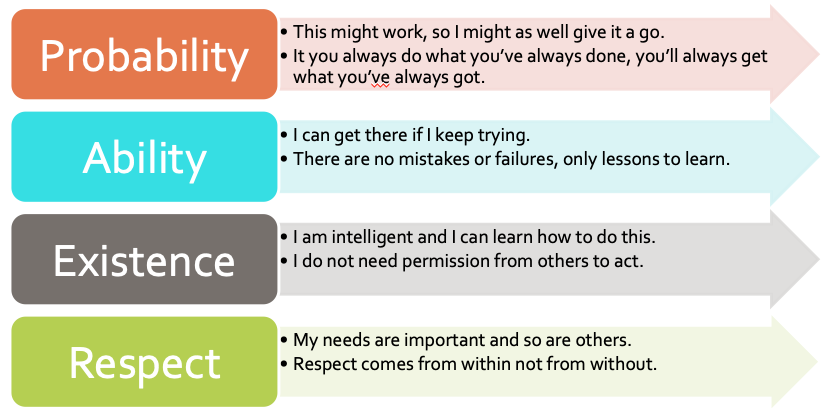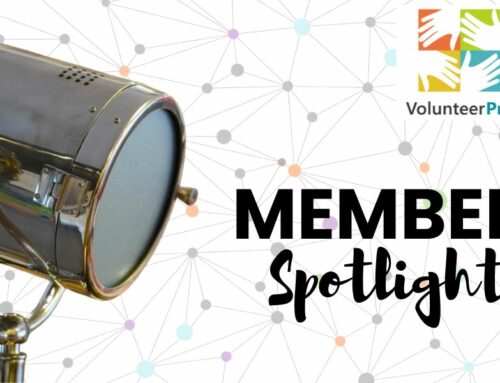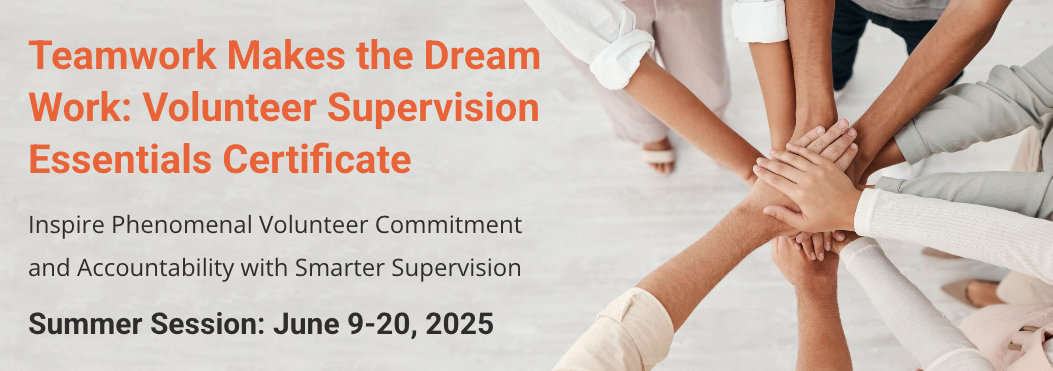
Your Mindset is Your #1 Volunteer Management Superpower
We’ve put together a free mini-series (1, 2, 3, 4, 5, 6) to help you develop your best volunteer program ever. Each focuses on a different volunteer management skills and comes with a free tool to help you master it.
First off, we’re starting with your mindset, which is the most important of all volunteer management skills.
When you think about planning your volunteer strategy and initiatives, do you see a chain link fence or a wide open field? Do you see gates and fences on the road ahead? Do you focus on scarcity and lack or see endless abundance and the potential for success?
How you think about future matters can have a decided impact on future success.
We tell ourselves plenty of things that may or may not be true. Consider buy-in, for example. Do you need everyone to agree with your plan in order to get traction at your agency? For success, do you need to spend a lot of time and effort convincing a majority of people to support you?
The truth is, it may not be as hard as you think.
It Only Takes 10% to Build Buy-In
Researchers estimate a small percentage of “committed minorities” are needed to sway group consensus toward a new way of thinking.
In fact, the prevailing majority opinion of your co-workers can be rapidly reversed by a small fraction of people throughout your organization who are committed to your change. You just need them to consistently talk up the change and remain steady in their support.
Specifically, when this committed fraction grows beyond 10%, the time it takes for the remainder of the group to adopt the new viewpoint rapidly increases.
So, building buy-in may be easier than you think. But, if you don’t believe… if you don’t develop the #1 volunteer management skill – your mindset – it’s possible you may never try.
Our Thought Patterns Can Stifle Success
How we view the probability of success (whether true or not) can intrude on our subconscious and stop us in our tracks. In the busy world of volunteer management, as leaders, we need to level up how we manage our inner selves.
We must proactively correct the impulses that work against us, including how our brains work.
In our attempt to understand the world, humans have a built-in tendency to create patterns in our minds. We learn rapidly by associating different things, which gives birth to recurring thoughts that color our world view and calcify into rigid mindsets.
Limiting Mindsets
According to Sources of Insight, “Mind-sets are those collection of beliefs and thoughts that make up the mental attitude, inclination, habit or disposition that predetermines a person’s interpretations and responses to events, circumstances and situations.”
Mindsets aren’t just any old beliefs, though. They are beliefs that drive our reactions and subsequent behaviors.
These tendencies aren’t all bad — they’ve helped us survive as a species. The faster we can recognize danger, the quicker we can take off running for the trees. But they can hurt us, too.
The problem with our awesome ability to create shortcuts is that sometimes these connections are false and potentially harmful.
Based on the assumption that past experiences dictate future realities, we end up foster limiting beliefs that create false boundaries. These largely subconscious conclusions often block forward motion.
In the end, our mindsets tell us what we can’t do, what we can’t achieve, what we can’t be. This is why, of all the volunteer management skills you could focus on, you’ll want to start here.
The ABCs of Limiting Beliefs
Although it may not always feel like it, you have the power right now to change your limiting beliefs and your life. You can take action. You can choose to respond in a creative, positive way to any situation by changing your mindset.
But, your ability to bring about change depends on you. You must believe you can before you succeed, not the other way around.
So, as you prepare for the coming year — what limiting beliefs might you need to tackle?
Limiting Beliefs are Not Truths
When we react to adverse situations, we form limiting beliefs. These are not “Truths.”
A limiting belief is nothing more than electrical impulses that live in your brain and have power only as long as you hold on to them.
What do you believe you can or can’t achieve? Do you place limits on your ability to lead your organization to the next level? What other volunteer management skills do you want to master? Are you accepting certain things as inevitable?
Though your beliefs feel comfortable, they may be working against you and clouding what is possible. Just as you have chosen to hold limiting beliefs, you can choose to let them go, one by one. You can replace them with something that serves you better.
Volunteer Management Skills 101: Mastering the Mindset
Transforming negative, limiting beliefs into positive, enabling ones exponentially increases your faith and confidence in your abilities and those of your volunteer team.
But, you must first become aware of your knee-jerk reactions in order to alter your thought patterns. If you do this consistently, you will form new, better-serving thought patterns and belief systems.
When you experience a problem or challenge, reflect on your conclusions about the situation. Play devil’s advocate and dispute your reality.
Ask yourself:
- Is it helpful for me to think this way?
- Am I missing anything? What else could have caused the problem?
- What proof do I have as to who’s at fault, whether the damage is permanent, or how important it may be to the overall picture?
- If what I believe is true, is it truly catastrophic?
You can also re-frame limiting beliefs by replacing them with enabling beliefs and “acting as if” they will be true even if we can’t know for sure. Although these enabling beliefs may not be true initially, they will help you move confidently move toward what you want.
Consider writing a mantra that guides your way and transforms your limiting belief into unlimited potential.
Mantras for Powerful Enabling Beliefs
When it comes to the brain, repetition is king. Once you’ve established a new pattern in your mind, you’ll move from uncertainty to recognition. You’ll see your new resulting behavior as acceptable, allowing you to feel more comfortable.
To boost repetitive thoughts, once you’ve decided on an enabling belief, look for evidence that your new belief is true. If you seek, you will find plenty of clues and proof. As you do, you’ll further cement your new point of view in your brain.
In addition, you can achieve even greater success by embodying the belief both physically and emotionally. To do this, stand with your eyes closed and imagine yourself acting on your belief. Focus on what you are doing and how it feels. Spend a few minutes here savoring your new reality.
The more you repeat enabling beliefs in your mind and body, the better chance they will have to stick.
5 Prevalent Mindsets (and how to change them)
The following are pervasive mindsets in the nonprofit space that develop as volunteer management skills grow. They should be examined and challenged.
Do any of these beliefs resonate with you?
Fixed vs. Potential
Limiting Mindset: Leadership and supervisory talent is innate; we’re either born with it or we’re not.
Enabling Mindset: My success is about finding the right tools and teachers and then putting in consistent effort and practice to learn to lead.
Futility vs. Efficacy
Limiting Mindset: Why even try when I am powerless to make progress in my environment where others control my access to resources?
Enabling Mindset: I have the courage to set meaningful goals and, with perseverance, I can create pathways to success from where I’m at.
Excluded vs. Belonging
Limiting Mindset: No one at my agency understands or values what the volunteer department does.
Enabling Mindset: There are people in my organization with similar experiences and values; I can find them by reaching out and starting conversations about shared goals.
Passive vs. Relevant
Limiting Mindset: Because volunteers are free, both they (and I) need very little infrastructure and support to be successful.
Enabling Mindset: The work of volunteers expands across our agency and is vital to our success; we all require adequate acknowledgement and support for their important work.
Scarcity vs. Prosperity
Limiting Mindset: Because I work in a nonprofit and in volunteer services, I should make extreme personal sacrifices and be content to scrape by; I should expect others (including those outside my organization) to do so, as well.
Enabling Mindset: I add unique value to my workplace and am faithfully doing my part to help our mission succeed; therefore, it is my organization’s responsibility to invest in my work and professional growth.
It may feel shocking to hear some of these mindsets spoken aloud. You might even argue whether they truly limit your progress and merit replacement.
But, consider this — which of the limiting mindsets listed above have served you? Have any been the bedrock of your success or increased your volunteer management skills?
Conversely, how might the enabling mindsets empower you and change your game plan forever?
Level Up Your Volunteer Management Game Plan in 2019 Mini Series
Ready to take on all those volunteer management skills and start planning program ever? Make sure to grab all your free tools: 2, 3, 4, 5, 6
Your first tool is ready to go below!





